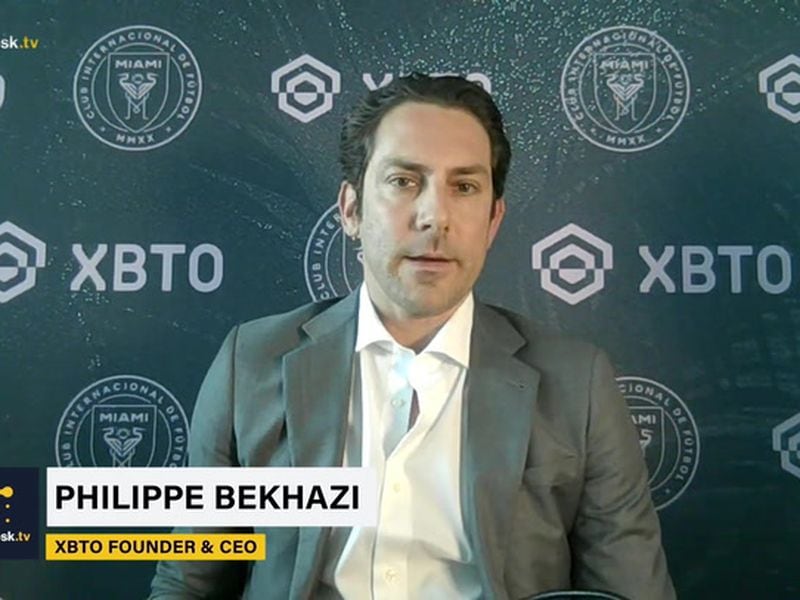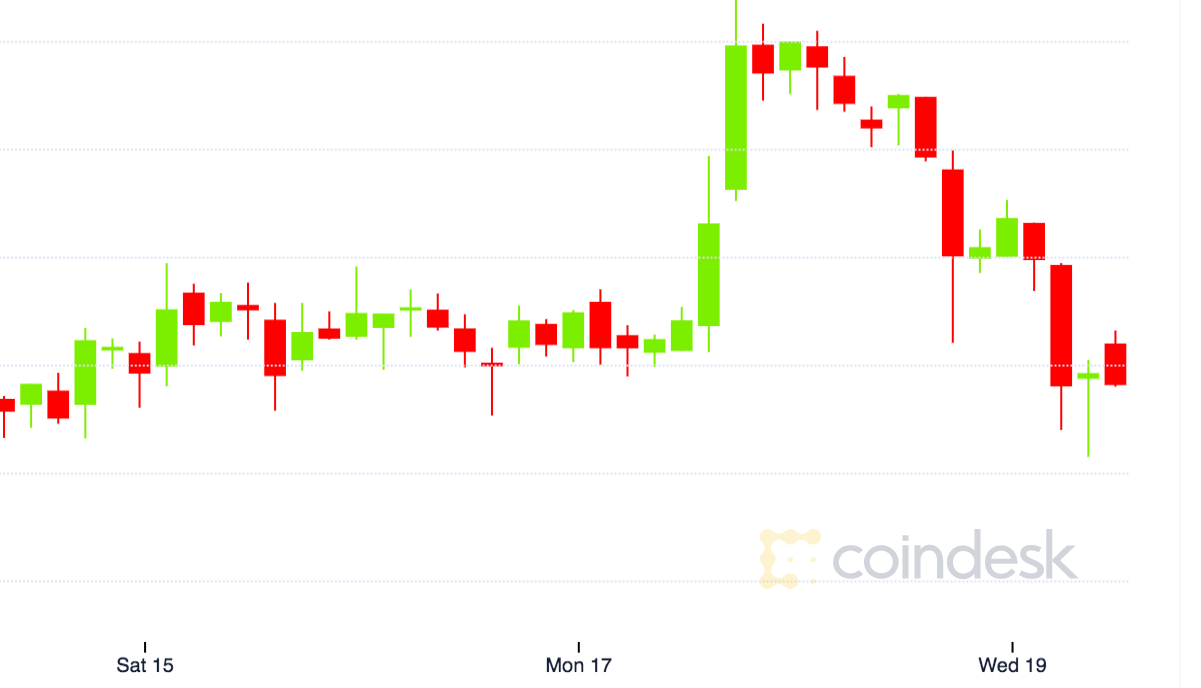CoinDesk Had a ‘Stash’ of BTC, and Other Stories Told by Consensus OG Joon Ian Wong
Join the most important conversation in crypto and Web3 taking place in Austin, Texas, April 26-28.
:format(jpg)/www.coindesk.com/resizer/vnZ-Veq8nIL_1EZIUunhEHOvN6s=/arc-photo-coindesk/arc2-prod/public/UO3R6YECBFGEBJASELT5ZK754A.jpg)
Daniel Kuhn is a features reporter and assistant opinion editor for CoinDesk’s Layer 2.
He owns BTC and ETH.
Join the most important conversation in crypto and Web3 taking place in Austin, Texas, April 26-28.
For years now, I’ve been saying that CoinDesk is one of the few companies in the crypto industry that deserves to have a book written about them. If you know anything of its 10-year history, the publication that’s sometimes called “Crypto’s Paper of Record” has seen a host of complicated characters filter in and out, and has a narrative arc that would make director James Cameron blush. Founded by a London-based multi-millionaire and later bought by a New York-based billionaire (though it’s complicated), CoinDesk has survived periods of severe penury as well as the excesses of multiple crypto bull markets – all the while publishing daily a staid accounting of the blossoming crypto industry (and biting commentary), including one of the most impactful financial news stories ever written.
Joon Ian Wong will be speaking next week at Consensus 2023 in Austin, Texas. Register here.
Joon Ian Wong, a journalist turned consultant and conference organizer with Cryptographic Media and Amplified Event Strategy, two startups he founded in the midst of the coronavirus panic, was at CoinDesk basically from the beginning. He covered the scene back when “the crypto market” was composed of only bitcoin and its various hard forks, before Ethereum had launched. He wrote profiles of, and sourced information from, the luminaries of the time, people who now would be nearly impossible to get on the phone, including BitMEX co-founder Arthur Hayes and Coinbase chief executive Brian Armstrong (see below).
Most importantly, however, Wong helped create Consensus – the flagship conference for CoinDesk, which has developed into something of a “Big Tent” event where all parts of the crypto industry can meet. Forgive me if this article seems a little salesy or self-indulgent (media people might also call it “inside baseball”), but there is value in hearing from people who have seen an industry mature and helped found some of its long-lasting traditions. Wong has insights for anyone looking to break into the lucrative crypto events business – and if that requires that we break the fourth wall by speaking to a former colleague, then so be it.
See also: Joon Ian Wong – Web 3 and the Rise of Small Media | Opinion
Wong discussed the founding of the historic conference, ahead of Consensus 2023 in Austin, Texas. We spoke about his early beat, and the people he met back then who have surprised him the most today. (This isn’t the only time CoinDesk will go meta at Consensus, which marks our tenth anniversary – we’re also putting together a package of stories called “CoinDesk Turns 10,” looking at the biggest stories of each year of its existence and why they still matter, and “Consensus @ Consensus,” a report digging into the agreed upon solutions that may emerge at the conference.)
The conversation has been edited for length and clarity.
So CoinDesk is doing this series called CoinDesk at 10 to celebrate its decade in existence. I was hoping we might get an oral history of Consensus, as you remember it, as one of the creators of the conference. Why did you guys think it was a good idea at the time to run a conference?
At the time, CoinDesk was running out of money, and we needed a slug of cash. I think we sold our stash of bitcoin; I forget how many, maybe 10 bitcoin at $300 a pop.
CoinDesk had a stash of bitcoin?
Yeah, one of the investors had invested using bitcoin. I think it was Barry [Silbert, founder of Digital Currency Group – CoinDesk’s current owner] actually. One second, my audio is refusing to connect.
Did you guys have something to model it on, or a way to know how much revenue it would bring in?
At the time, the main conference for the industry was an annual thing organized by the Bitcoin Foundation. I thought it was very partisan – for true believers. A publication like CoinDesk had an opportunity to do something that was, you know, more arm’s length, more objective, more neutral, you might say, and investigate the industry a bit more. Consensus was always about bringing in people who would not necessarily be in a room together under ordinary circumstances. That first conference we had Bitcoin Core developers like Greg Maxwell and Mike Hearn. We also had a young developer named Vitalik Buterin, who was trying to build a new [blockchain] called Ethereum. And we had [former U.S. prosecutor] Katie Haun, who had investigated the Silk Road, the FBI, the IRS. So it was really a convening of people with an interest in the technology but who had never been asked to sit around the same table.
What were the vibes of conferences like back then – it was technically a bear market, no?
I only went to one at the time, something called Coin Summit in London, organized by an investor. I remember there were people from Peter Thiel’s Founders Fund – VCs, founders. It was essentially a Silicon Valley tech conference, as opposed to something ideological like the Bitcoin Foundation ones. The biggest conference back then was probably the big one in Amsterdam in 2014. That had a festival-ish feel to it crossed with a political rally. I’m saying this not as an attendee, but somebody who read coverage of it. Consensus aimed to be more about business, talking shop.
Correct me if I’m wrong, but CoinDesk then was still based in the UK. Why Manhattan?
I can’t remember exactly why we chose New York … but we ended up picking it! Speaking as somebody in the conference business, events in the U.S. make more money. You can charge more, people expect to pay more for tickets. So that was probably the reason.

Joon Ian Wong was also a co-founder of the Association of Cryptocurrency Journalists and Researchers. (ACJR)
Speaking very generally, crypto has two long-standing identities – tech and finance, which are related at times. There’s the blockchain-for-apps side, and the crypto-for-money thing. Does the decision to choose New York say anything about the priorities of the industry at the time?
Yeah, the tech versus finance question is interesting. By 2015 bitcoin had dropped to $200, right, people were saying “this is over, we’re moving on. This industry is dead.” The only activity left was coming from the blockchain-not-bitcoin people. These were major financial institutions and banks saying we can use this technology, but we don’t need this bitcoin stuff – they were very keen to get away from the speculative aspects of bitcoin. A lot of people make fun of that disembodied blockchain stuff but, you know, in bear markets, that is one of the dominant narratives and it does keep interest and attention on the industry. So 2015 was one of those years. Blythe Masters, who had been an executive at JPMorgan, was getting into the space. Our main sponsor was Citi. PwC and Deloitte were issuing reports. It was things like that driving interest. I think this was before Ethereum even launched.
When would you say the lifestyle elements of crypto started filtering in?
The crypto lifestyle is basically the same as that of a “tech nomad,” but with money, right? Instead of being a broke freelance writer in Bali, you actually have [a load] of money and you fly business class and stay in nice hotels or at least nice Airbnbs. And you don’t really care where you have dinner. I think, you know, there are people who live that lifestyle who go from country to country.
We are still playing at the edges of what [digital scarcity] really means.
How far down the rabbit hole are you?
I would say I’ve deeply adopted it.
In my work. Not really for me, personally.
This is a question that’s been litigated too often, but how important is hands-on experience for understanding what’s going on?
In my own experiences as a working journalist covering the space, I would always try to use the technology – the products and features – before having conversations with people about them. I’d argue it’s quite difficult to cover the space well, if everything’s an abstraction. [Bloomberg columnist] Matt Levine is very good at understanding abstractions and commenting on them – he may not need to open a MetaMask wallet to understand what he’s reading. But for the vast majority of people covering crypto, it probably pays to use it.
Do you have a story you’re proud to have written?
Nor really, I think my reporting record with CoinDesk was largely undistinguished. I wrote one of the early profiles of Wall Street people who quit to join bitcoin – that was one of the narratives back then. A lot of those early stories were interesting snapshots of people in the very early stages of being who we know today.
Anyone who you’re completely surprised at how they turned out?
I did a profile of a young former trader named Arthur Hayes. You can Google around CoinDesk.com and see. I would message Arthur for, you know, comments on the bitcoin price. There were no market analysts back then you could ask for comments. There were traders and that was it. Arthur was just a guy with some professional Wall Street experience. There’s like this joke: Bitcoin went up a quarter and then quickly went down and I’d asked him why that happened. And he would always give some intelligent response. But I knew he was in Hong Kong, and I would always check the time and he’d reply to me at 6 a.m., 4 a.m. until 10 p.m. He would always respond immediately. It was always a mystery to me. But, you know, I guess he was very busy building the BitMEX [exchange]. It’s interesting looking back at those early sources and thinking about what they were like versus where they ended up today. You know, this person did this or that or they ended up in jail or they’re a convicted felon. All of which can be true for one person.
This is fun. Give me another one.
I never would have thought Vitalik could have become quite the icon that he is today. Or that Katie Haun would be one of the most successful VCs of all time. Or even that Arthur Hays would have this redemption narrative. For most people I think it would have been quite difficult to predict where they ended up today. Perhaps even Brian Armstrong. This is not directly CoinDesk related, but I interviewed him in 2014 when he came to London as part of this big Coinbase world tour. You have to remember Coinbase started out as a wallet, competing with the Blockchain Dot Info. There was no exchange business. I think it was the world tour when they pivoted to become a brokerage. We had the interview near the CoinDesk office in Fitzrovia in London, and then that evening there was this very long-running meetup called Coin Scrum, which has been running since 2013, at a bar in East London near where I live. It was a packed house. You know, Brian Armstrong is gonna come and talk to us (even back then Coinbase was one of the better-funded startups). So he gave his talk and I remember a band of people came into the bar led by Amir Taaki [who, at the time, was one of the most prominent Bitcoin Core developers] and started heckling him. You know, “you’re centralized.” “You’re fiat.” There were three or four of these guys, who I think all lived in the same East London squat, shouting at him from the crowd. Even back then, he was very even-tempered. He was trying to respond to them point by point. But he kind of got drowned out. There’s this sort of endearing image of the space back then. I just don’t think you’ll ever see Brian Armstrong and Amir Taaki in the same room ever again. People like Gavin Wood or Vitalik, they would go to these meetups and bars and try to convince people that their thing – Ethereum, whatever – was this great, wonderful thing. You’d have a motley crew of people listening to them. And from those very unlikely beginnings, you have kind of these quote unquote corporate titans of the day.
I guess that energy sort of shifted to conferences. What do you make of the phrase “it’s always crypto week somewhere?”
It’s been largely true. Maybe not quite as true as in some of the more hectic days. In 2021 you had people spending marketing budgets. But there’s a qualitative dimension to this: There are crypto weeks and there are crypto weeks. A lot of events lack substance where, for example, the speakers are sponsors. Real – to use a term of art – Schelling points are a breed apart and become genuine gatherings of a community, ecosystem or industry. Denver is one of those. DevCon is probably one of those. Consensus is one for a very broad community. Or even early ones like the North American Bitcoin Conference where Vitalik discussed the Ethereum white paper on stage and was mobbed by investors as he got off. The tradition of genuine product launches and innovation happening and collaboration happening at conferences runs quite deep. But I don’t think they should get mixed up with this idea of “crypto weeks,” which were invented by CoinDesk beginning with New York Blockchain Week, or purely promotional events that take place.
What’s the role of marketing at these things, or in the industry in general – like, how much of crypto culture is genuinely bottom up?
It’s kind of recursive. To follow in the footsteps of George Soros, I think people often start with a narrative and then need the market or reality to respond in that way for it to actually gain traction. You might claim something as a narrative, but that doesn’t mean it’s gonna take hold. It is more likely to take hold if it is actually true. So if you say like, Ethereum is this revolutionary thing and all these developers are really interested in it – at some point you actually need those developers to actually show up and start building stuff. That’s the recursive part of it. Lots of people try and do it but the best conferences are ones that do not just reflect existing sentiment but intensify it. Take the first Consensus. There was genuinely a lot of interest in crypto from various corporate financial parties, and the conference helped to intensify that feeling. It brought together all these people and put them in a room and let them talk to each other in a way that otherwise would not necessarily have been possible. That’s essentially the role of conferences and crypto media.
I tend to excuse the worst aspects of crypto by saying “it’s future-forward.” We’ve seen a lot of pushback on the idea recently – with people asking, it’s been 13 years, what does the industry have to show for it? Do you think we even know what crypto is for yet?
I mean, it’s a cliche, but we’re still early. If you think about [artificial intelligence], for example, you might claim you can trace its lineage back to cybernetics in the 1950s and only today do we have decent chatbots. I still think digital scarcity is the main innovation of crypto, and we are still playing at the edges of what that really means, particularly as digital material, you know, digital stuff, proliferates exponentially. This is kind of the counterweight to the original thought of the internet as this utopian place of abundance. You can copy everything. It’s boundless. There’s just more and more and more stuff. We’re only now discovering that, you know, all this stuff isn’t great – like, there’s a lot of downsides and more and more stuff. Crypto is a counterweight to that big overarching trend that’s been happening since the commercialization of the internet in the 1990s. It adds a little friction.
That’s a beautiful way of putting it.

DISCLOSURE
Please note that our
privacy policy,
terms of use,
cookies,
and
do not sell my personal information
has been updated
.
The leader in news and information on cryptocurrency, digital assets and the future of money, CoinDesk is a media outlet that strives for the highest journalistic standards and abides by a
strict set of editorial policies.
CoinDesk is an independent operating subsidiary of
Digital Currency Group,
which invests in
cryptocurrencies
and blockchain
startups.
As part of their compensation, certain CoinDesk employees, including editorial employees, may receive exposure to DCG equity in the form of
stock appreciation rights,
which vest over a multi-year period. CoinDesk journalists are not allowed to purchase stock outright in DCG
.
:format(jpg)/www.coindesk.com/resizer/vnZ-Veq8nIL_1EZIUunhEHOvN6s=/arc-photo-coindesk/arc2-prod/public/UO3R6YECBFGEBJASELT5ZK754A.jpg)
Daniel Kuhn is a features reporter and assistant opinion editor for CoinDesk’s Layer 2.
He owns BTC and ETH.
Learn more about Consensus 2023, CoinDesk’s longest-running and most influential event that brings together all sides of crypto, blockchain and Web3. Head to consensus.coindesk.com to register and buy your pass now.
:format(jpg)/www.coindesk.com/resizer/vnZ-Veq8nIL_1EZIUunhEHOvN6s=/arc-photo-coindesk/arc2-prod/public/UO3R6YECBFGEBJASELT5ZK754A.jpg)
Daniel Kuhn is a features reporter and assistant opinion editor for CoinDesk’s Layer 2.
He owns BTC and ETH.









